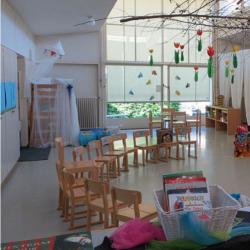Recommendations for parents on the labor education of a child in the family. Memo for parents: "Labor education of children in the family" Memo on labor education
The essence of children's labor education is to introduce them to available work activities and develop a positive attitude towards the work of adults. But in order for a child to be actively involved in work, it is important to instill in him labor skills and abilities, the desire and desire to work independently.
Labor education of children should not be carried out in isolation from family education. The family has favorable conditions for developing hard work in children. Working together with parents brings joy to the child. Participation in household work allows the child to really feel his involvement in the concerns of the family, to feel like a member of the family team. It is important to organize the work of children by parents in such a way that children can not only observe it, but also participate in it. To successfully implement labor education in the family, parents can follow the following recommendations:
Involve the child in the work activities of the family as early as possible;
Assign permanent responsibilities to the preschooler, for which he is responsible;
Do not allow deviations from the requirements accepted by adults, otherwise the child will shirk fulfilling his responsibilities;
Do not punish your child with work: work should please and bring satisfaction;
Teach a child to work, instilling in him basic work culture skills: rational work methods, proper use of tools, planning the labor process, completing work;
Do not give the child excessive tasks, but assign work with sufficient load;
Do not rush, do not rush the child, be able to wait until he completes the work himself;
Do not forget to thank the child for what required special efforts from him;
A child values and cherishes what he has made with his own hands, so it is necessary to involve him in socially useful work. This is where the education of respect for the public property begins.
Lyubov Alekseeva
Memo for parents on labor education of children in the family
Memo for parents on labor education of children in the family.
Essence labor education preschoolers is to introduce them to accessible labor activities and developing a positive attitude towards them adult labor. But in order for the child to be actively involved in labor activity, it is important to instill in him labor skills and abilities, desire and desire work independently.
Labor education of children should not be carried out in isolation from family education. IN family there are favorable conditions for the formation of children of hard work. Working with parents brings joy to the child. Participation in household activities labor allows the child to really feel involved in the cares families, feel like a member of a family team. It's important to organize labor of children by parents in this way so that children can not only watch it, but also participate in it.
For successful implementation labor education in the family parents may be guided by the following recommendations:
Introduce the child to family work matters as early as possible;
Assign permanent responsibilities to the preschooler, for which he is responsible;
Do not allow deviations from the requirements accepted by adults, otherwise the child will shirk fulfilling his responsibilities;
Don't punish your child labor: work should make you happy, bring satisfaction;
Teach a child work, instilling in him basic cultural skills labor activity: rational work methods, correct use of tools labor, process planning labor, completion labor;
Do not give the child excessive tasks, but assign work with sufficient load;
Do not rush, do not rush the child, be able to wait until he completes the work himself;
Do not forget to thank the child for what required special efforts from him;
A child values and cherishes what he has made with his own hands, so it is necessary to involve him in socially useful activities. labor. This is where it begins upbringing respect for the public domain.
Publications on the topic:
Consultation on labor education “Child’s work in the family” The work activity of a preschooler, skillfully supervised by adults, has a significant impact on the development of the child’s strong-willed traits, his thinking.
Summary of the conversation on the labor education of children in the preparatory group Summary of a conversation on the labor education of children in the preparatory group Topic: “How a shirt grew in a field” Program content: Purpose:.
Abstract of OOD on labor education “Cleanliness Service” Integration of educational areas: area of social and communicative development, cognitive development, speech development, physical.
Summary of an open lesson for children of the second junior group on labor education “Washing doll dishes” Program content: 1. Teach children to correctly perform individual actions and, based on their assimilation, form elementary activities.
Goal: Development of labor skills in children, education of responsibility and independence in the process of joint work in a corner of nature.
Summary of a lesson on labor education for children 6–7 years old “Workshop of good deeds” Goal: to cultivate a sense of responsibility for the assigned task, satisfaction from the successful completion of work. Objectives: improve skills.
Labor education lesson “Children’s work in a corner of nature” 1. Type of activity: labor education 2. Topic: “Children’s work in a corner of nature.” 3. Program content: To develop labor skills.
Labor education is the preparation of a child for life, for participation in socially useful work, the formation of an active, purposeful personality. Preschool age is the beginning of a child’s labor education; it is in this period of life that he first begins to experience the need for independent activity.
Labor education is a necessary and essential condition for the successful preparation of children for school. Children raised to work from an early age are distinguished in school by their independence, organization, activity, neatness, and ability to take care of themselves.
In the process of working, a child develops many positive personality traits, and also improves the skills that the child already possesses. And the harmonious combination of work activities with other types of activities opens up wide opportunities for the development of the child in various directions.
The foundations of labor education are laid in the family. The family is a friendly work team. A love of work must begin to be cultivated at an early age. Imitation, characteristic of a child, is one of the most important motives that encourage children to be active. Watching adults work gives rise to a desire to do the same. Not to extinguish this desire, but to develop and deepen it is the main task of parents if they want to raise a child to be a hard worker.
The main task of the family in the field of labor education is to organize the child’s activities so that it has the maximum educational impact on him.
Basic principles of family work in the labor education of children:
Introduction to work through self-service;
A gradual transition from self-service to socially useful work;
Gradual expansion of the range of responsibilities, their complication;
Constant quality control of work assignments;
Organization of training in performing labor operations;
Forming in the child confidence in the importance of performing the work assigned to him;
Taking into account the individual characteristics and inclinations of the child when distributing work assignments;
Encouragement of diligent execution of assignments, manifestation of independence and initiative.
Family work should be feasible for the child. It is not at all necessary to entrust cleaning the entire apartment to the baby, but asking him to wipe the dust from the windowsill is quite possible. Use the opportunity - interest. Any child is interested in working with a vacuum cleaner. Of course, he won’t do much, but he will gain some skills. The connection between work and play is important in preschool age - play images help children do work with great interest.
It is easier to teach a child to work while playing. For example, your house is a spaceship and needs to be cleaned before departure. Young children easily humanize inanimate objects - this quality can be used effectively. Tell your child on behalf of the toy that it is cold for her to lie on the floor, or let the bear ask to be put on the shelf.
Remember: when giving instructions to a child, it is necessary to clearly explain what should be done and why this is being done. The child needs to know why he needs to perform certain tasks and what result should be achieved.
This is how preschoolers will form an idea of the need for these actions. Therefore, we always need to explain why we are working. For example, if flowers are not watered, they may die; If we don't wash the dishes, we won't be able to eat.
The child is trying to cope with difficulties, therefore, it is so necessary to support the child and notice even the smallest success. This will help him overcome his self-doubt. Will help you do your job better.
The work of a child should not go unnoticed by adults. Any work should be encouraged: thank the child, praise, appreciate his efforts. Even if the child did something wrong. And if he breaks something, don’t even think about scolding him, because the child wanted to help. Work and its results must be accompanied by positive emotions. The activities of adults serve as role models for children. If the adults themselves work with enthusiasm, then the child will strive for the same. When a child sees that work for adults is a heavy burden, then he himself will have the same attitude. Therefore, parents themselves should take on any work with desire, diligence and responsibility, setting a good example for their children.
Teach your child to complete the work he has started, do not rush or rush the child, know how to wait until he completes the work himself.
In parallel with labor education, it is necessary to cultivate respect for the work of adults and a careful attitude towards its results.
Tips for parents:
1. Be consistent in your demands.
2. Consider the individual and age characteristics of your children.
3. Before entrusting something to a child, show an example of the correct execution of the assignment, teach this to your son and daughter, and complete the assignment several times together.
4. Do not forget about playful moments in the labor education of children.
5. Teach your child to respect the work of other people and take care of the results of their work. Tell your children about your work and your friends.
6. Tactfully evaluate the results of your child’s work.
Here comes some exercise for our hardworking little hands!
Let's help hands become hardworking!
Games to develop tactile memory
Finger games.
Laying out cereals and pasta.
Laying out a wide variety of objects according to an adult’s model and according to a child’s design.
Laying out (matches, sticks).
Games with natural materials (beads made from berries, patterns from shells, pebbles).
Knitting (crochet, knitting needles).
Use of simple and accessible materials.
Drawing (brush, chalk, pencil).
Modeling (plasticine, clay, dough).
Lacing, buttoning.
Weaving (threads, wire, vine, grass).
Prepared by teacher Galetskaya Lyudmila Anatolyevna






